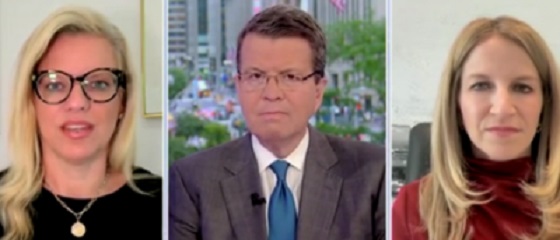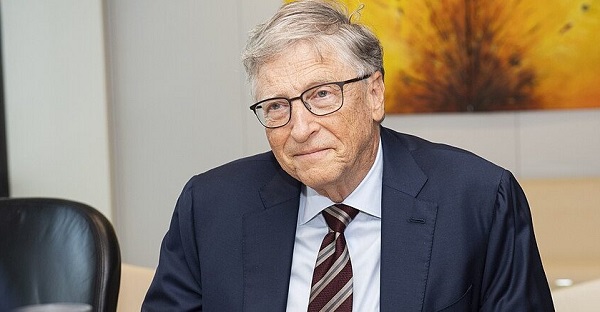Daily Caller
Pollsters Say RFK Jr. Endorsement ‘Could Have A Really Big Impact’ And ‘Help Trump’

 From the Daily Caller News Foundation
From the Daily Caller News Foundation
By Jason Cohen
Republican pollster Lee Carter and Democratic pollster Carly Cooperman on Friday said that independent candidate Robert F. Kennedy Jr.’s endorsement of former President Donald Trump could significantly boost his campaign.
Kennedy announced during a Friday speech that he would suspend his campaign and endorse Trump in states where he is not on the ballot, only withdrawing his name from consideration in key battleground states as not to spoil the vote. Carter and Cooperman, on “Your World With Neil Cavuto,” said that in such a close election, the votes that Trump could gain from Kennedy’s decision might boost his chances of defeating Vice President Kamala Harris.
WATCH:
“When you’re looking at these battleground states, we’re looking at averages where Donald Trump might be ahead by 0.2%, and just getting some of those votes could have a really big impact. And I think RFK Jr. knows this,” Carter said. “He was very, very keen to say, ‘I am withdrawing my name from these 10 states because I know it can have an impact.’ And so I think there is a very, very clear directive here.”
“It’s absolutely the case that the polls in these swing states show that with RFK removed, there is a small advantage that goes to Donald Trump. And in these states, every single vote really does matter. This makes a lot of sense,” Cooperman said. “Democrats are far more enthusiastic about Kamala Harris as their presidential candidate than they were about Joe Biden. And so you’re seeing much more coalescing among Democrats for Kamala, and therefore the support that RFK was getting in the most recent polls was certainly going to help Trump more so with him removed from it.”
Cooperman also noted “there is uncertainty” about what Kennedy’s supporters will do in November.
“It’s going to really depend, what are these voters going to do? Are they going to stay home or are they going to throw their support behind Donald Trump? I’m very curious now to see how RFK Jr. is integrated into Donald Trump’s campaign and what kind of role they’re going to talk about for him and how they might use this,” Carter added.
“I think Donald Trump’s got to return himself to sort of the underdog status that would help to get those RFK Jr. supporters on his side,” the Republican pollster said.
Kennedy’s support plunged to as low as 2% as of early August, according to an Economist/YouGov poll. Trump is presently beating Harris in the main battleground states by 0.1%, according to the RealClearPoltics average.
A “Morning Joe” panel sounded the alarm on Friday about how difficult it will be for Harris to beat Trump, with the race being so tight and the former president historically outperforming polls on election day.
“You got to look at states like North Carolina and Arizona and, of course, Georgia. Now, you may get a break with minority voting down in Georgia, but you could also come up short in Pennsylvania and not quite win in North Carolina,” former MSNBC host Chris Matthews said. “This could squeak. This could be the toughest election, because if Pennsylvania doesn’t go the Democratic way and North Carolina doesn’t go that way, it’s tough, it’s really tough.”
Censorship Industrial Complex
School Cannot Force Students To Use Preferred Pronouns, US Federal Court Rules


From the Daily Caller News Foundation
“Our system forbids public schools from becoming ‘enclaves of totalitarianism.’”
A federal appeals court in Ohio ruled Thursday that students cannot be forced to use preferred pronouns in school.
Defending Education (DE) filed the suit against Olentangy Local School District (OLSD) in 2023, arguing the district’s anti-harassment policy that requires students to use the “preferred pronouns” of others violates students’ First Amendment rights by “compelling students to affirm beliefs about sex and gender that are contrary to their own deeply held beliefs.” Although a lower court attempted to shoot down the challenge, the appeals court ruled in a 10-7 decision that the school cannot “wield their authority to compel speech or demand silence from citizens who disagree with the regulators’ politically controversial preferred new form of grammar.”
Because the school considers transgender students to be a protected class, students who violated the anti-harassment policy by referring to such students by their biological sex risked punishments such as suspension and expulsion, according to DE.
Dear Readers:
As a nonprofit, we are dependent on the generosity of our readers.
Please consider making a small donation of any amount here.
Thank you!
“American history and tradition uphold the majority’s decision to strike down the school’s pronoun policy,” the court wrote in its opinion. “Over hundreds of years, grammar has developed in America without governmental interference. Consistent with our historical tradition and our cherished First Amendment, the pronoun debate must be won through individual persuasion, not government coercion. Our system forbids public schools from becoming ‘enclaves of totalitarianism.’”
OLSD did not respond to the Daily Caller News Foundation’s request for comment.
“We are deeply gratified by the Sixth Circuit’s intensive analysis not only of our case but the state of student First Amendment rights in the modern era,” Nicole Neily, founder and president of DE, said in a statement. “The court’s decision – and its many concurrences – articulate the importance of free speech, the limits and perils of public schools claiming to act in loco parentis, and the critical role of persuasion – rather than coercion – in America’s public square.”
“Despite its ham-fisted attempt to moot the case, Olentangy School District was sternly reminded by the 6th circuit en banc court that it cannot force students to express a viewpoint on gender identity with which they disagree, nor extend its reach beyond the schoolhouse threshold into matters better suited to an exercise of parental authority,” Sarah Parshall Perry, vice president and legal fellow at DE, said in a statement. “A resounding victory for student speech and parental rights was long overdue for families in the school district and we are thrilled the court’s ruling will benefit others seeking to vindicate their rights in the classroom and beyond.”
Business
Bill Gates Gets Mugged By Reality


From the Daily Caller News Foundation
You’ve probably heard by now the blockbuster news that Microsoft founder Bill Gates, one of the richest people to ever walk the planet, has had a change of heart on climate change.
For several decades Gates poured billions of dollars into the climate industrial complex.
Some conservatives have sniffed that Bill Gates has shifted his position on climate change because he and Microsoft have invested heavily in energy intensive data centers.
AI and robotics will triple our electric power needs over the next 15 years. And you can’t get that from windmills.
What Bill Gates has done is courageous and praiseworthy. It’s not many people of his stature that will admit that they were wrong. Al Gore certainly hasn’t. My wife says I never do.
Although I’ve only once met Bill Gates, I’ve read his latest statements on global warming. He still endorses the need for communal action (which won’t work), but he has sensibly disassociated himself from the increasingly radical and economically destructive dictates from the green movement. For that, the left has tossed him out of their tent as a “traitor.”
I wish to highlight several critical insights that should be the starting point for constructive debate that every clear-minded thinker on either side of the issue should embrace.
(1) It’s time to put human welfare at the center of our climate policies. This includes improving agriculture and health in poor countries.
(2) Countries should be encouraged to grow their economies even if that means a reliance on fossil fuels like natural gas. Economic growth is essential to human progress.
(3) Although climate change will hurt poor people, for the vast majority of them it will not be the only or even the biggest threat to their lives and welfare. The biggest problems are poverty and disease.
I would add to these wise declarations two inconvenient truths: First: the solution to changing temperatures and weather patterns is technological progress. A far fewer percentage of people die of severe weather events today than 50 or 100 or 1,000 years ago.
Second, energy is the master resource and to deny people reliable and affordable energy is to keep them poor and vulnerable – and this is inhumane.
If Bill Gates were to start directing even a small fraction of his foundation funds to ensuring everyone on the planet has access to electric power and safe drinking water, it would do more for humanity than all of the hundreds of billions that governments and foundations have devoted to climate programs that have failed to change the globe’s temperature.
Stephen Moore is a co-founder of Unleash Prosperity and a former Trump senior economic advisor.
-

 espionage2 days ago
espionage2 days agoU.S. Charges Three More Chinese Scholars in Wuhan Bio-Smuggling Case, Citing Pattern of Foreign Exploitation in American Research Labs
-

 Business1 day ago
Business1 day agoCarney budget doubles down on Trudeau-era policies
-

 COVID-191 day ago
COVID-191 day agoCrown still working to put Lich and Barber in jail
-

 Business1 day ago
Business1 day agoCarney’s Deficit Numbers Deserve Scrutiny After Trudeau’s Forecasting Failures
-

 Business1 day ago
Business1 day agoCarney budget continues misguided ‘Build Canada Homes’ approach
-

 International1 day ago
International1 day agoKazakhstan joins Abraham Accords, Trump says more nations lining up for peace
-

 armed forces15 hours ago
armed forces15 hours agoIt’s time for Canada to remember, the heroes of Kapyong
-

 Business1 day ago
Business1 day agoHere’s what pundits and analysts get wrong about the Carney government’s first budget






